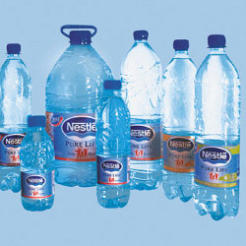Baby Milk Action has asked the Charity Commission to investigate sponsorship of the London Marathon by Nestlé, after failed attempts to discuss the Nestlé deal with the London Marathon Charitable Trust.
Baby Milk Action campaigns for people to boycott Nestlé products because it claims the company's marketing of breast milk substitutes in poor countries threatens the health of infants.
It has contacted the Charity Commission regarding Nestlé's sponsorship of bottled water at the London Marathon. Nestlé's Pure Life brand has been the official water of the Marathon since 2010.
A Baby Milk Action spokesman said: “When Baby Milk Action contacted the London Marathon Charitable Trust last year, the first time water at the event was branded as Nestlé Pure Life, to discuss the sponsorship policy and introducing ethical clauses if these did not exist, it was told the policy was ‘confidential’.
“All efforts to enter into discussion of the appropriateness of Nestlé were met with the response of ‘no comment'.”
The London Marathon Charitable Trust referred enquiries to its trading arm London Marathon Ltd.
Nick Bitel, chief executive of London Marathon Ltd, told Civil Society that Nestlé Pure Life had “nothing to do with the charity”.
“Nestle is a sponsor of the London Marathon, owned by London Marathon Ltd. We have explained this to Baby Milk Action,” he said.
However, Mike Brady, campaigns and network co-ordinator at Baby Milk Action, argued that surpluses from sponsorship and income made by the London Marathon Ltd are passed to the London Marathon Charitable Trust: “Do they have no interest in where the money comes from?” he said. “It will be interesting to see what the Charity Commission makes of it. Can a charity set up a wholly-owned subsidiary and escape all responsibilities for it?”
Baby Milk Action has asked the Charity Commission to investigate the Nestlé sponsorship, referring to Charity Commission guidance on fundraising and sponsorship which states: "Charities should be transparent about any relationship they have with a commercial partner and put in place the appropriate safeguards."
The guidance goes on: "Charities should be particularly cautious as co-branding or closely associating the charity with a company can become problematic if the company is discovered to engage in unethical practices or criminal activity. Charities need to carefully research the commercial participator and should consider whether a partnership with the commercial participator is appropriate and in line with the charity’s values and objects."
Baby Milk Action claims that Nestlé is one of the four most boycotted companies in the world because it is accused of marketing baby milk with strategies that violate international standards.
A Nestlé spokeswoman said: “Nestlé fully supports the World Health Organisation's recommendation of exclusive breastfeeding for six months followed by the introduction of appropriate complementary foods and continued breastfeeding thereafter.
“In the developing world, Nestlé has adopted the strictest rules in the industry concerning marketing practices of infant formula and fully complies with the WHO Code of Marketing of Breast Milk Substitutes. Nestlé has set up a significant programme of WHO Code compliance and monitoring. The Nestlé system is recognised as best in class by social investment groups.
“On 11 March 2011, FTSE Group recognised Nestlé’s efforts in this field and announced that Nestlé will be added to the FTSE4Good Global Index Series. Nestlé is the first infant formula company to have met the FTSE4Good Breast Milk Substitute (BMS) Marketing Criteria selection criteria and to be included in this Index. The BMS criteria build on the International Code of Marketing of Breast Milk Substitutes (WHO Code) and on subsequent World Health Assembly (WHA) resolutions.”
A Charity Commission spokeswoman said it would consider the concerns raised and decide whether there was any regulatory interest.









